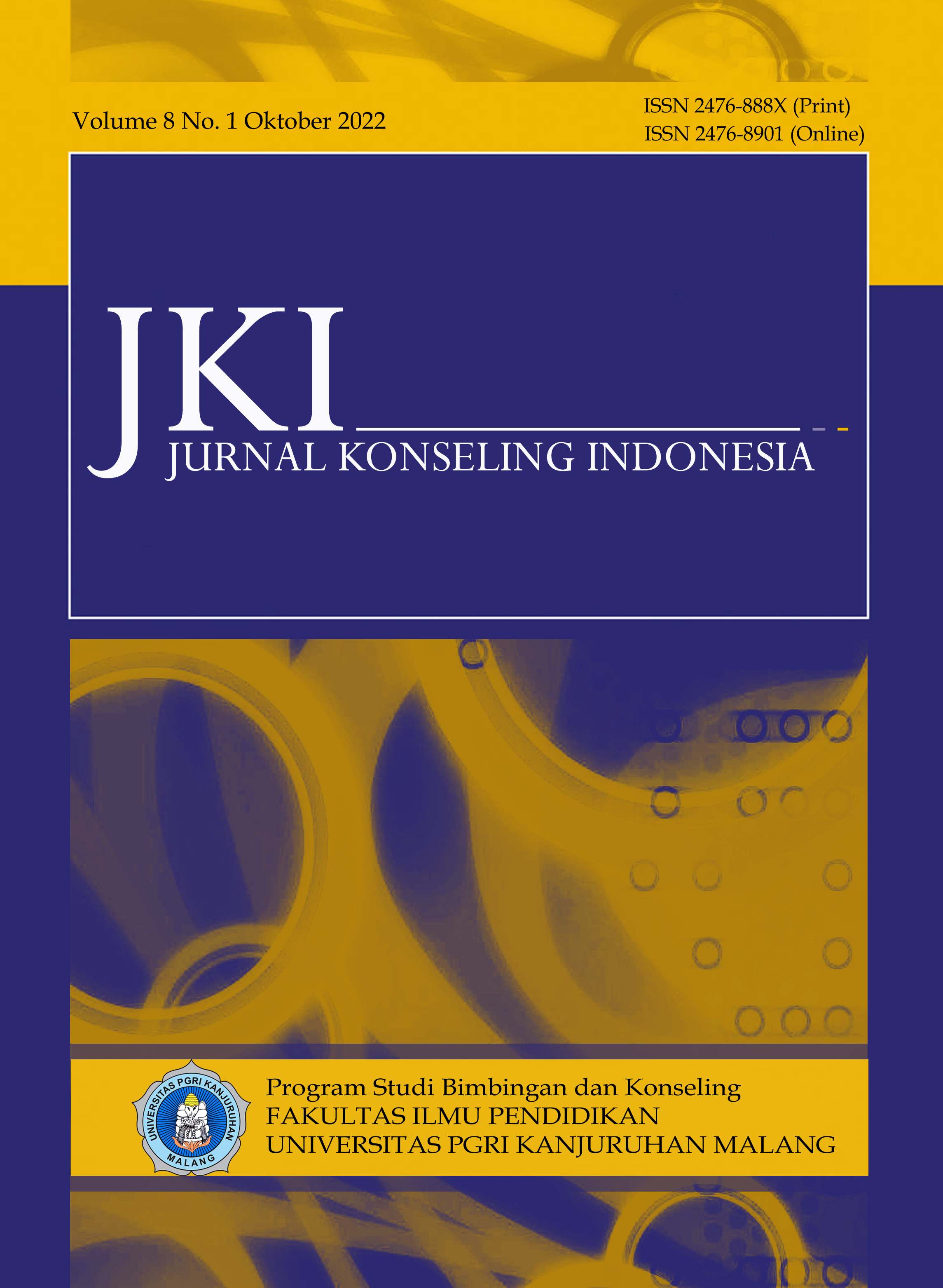Keefektivan Konseling Ringkas Berfokus Solusi untuk Meningkatkan Motivasi Belajar Siswa
Main Article Content
Abstract
There are still many students who have low learning motivation so that it hinders the learning process. The purpose of this study was to determine the effectiveness of Solution Focused Brief Counseling in increasing student motivation in junior high school. This study uses a experimental method with one group pretest-posttest design. The sample consisted of 5 students was selected using a Purposive Sampling technique with low learning motivation. The instrument used learning motivation scale with Likert model scale. Data were analyzed using descriptive analysis, effect size calculations and Reliability Change Indexs and nonparametric Wilcoxon signed-rank test. The results showed that there were differences between the values of the pretest and posttest. The level of learning motivation of the research subjects from the pretest average score of 58.4 which is included in the low category, increased to an average of 91.2 when the posttest was included in the medium category. Based on the Wilcoxon test obtained a significance value of 0.043<0.05, which means Solution Focused Brief Counseling effective to increase student learning motivation.
Article Details
References
Afdal, A. (2015). Kolaboratif: Kerangka kerja konselor masa depan. Jurnal Konseling Dan Pendidikan, 3(2), 1–7.
Ardi, Z., & Sisin, M. (2018). The Contribution of Assertive Technique Behavioral Counseling to Minimize the Juvenile Delinquency Behavior. Jurnal Konseling Dan Pendidikan, 6(2), 67–77.
Banting, R., Butler, C., & Swift, C. (2018). The adaptation of a Solution Focused Brief Therapy domestic violence perpetrator programme: a case study with a client with a learning disability. Journal of Family Therapy, 40(4), 489–502.
Capuzzi, D., & Stauffer, M. D. (2016). Counseling and psychotherapy: Theories and interventions. John Wiley & Sons.
Corey, G. (2011). Theory and Practice of Counseling and Psychotherapy. Belmot, CA: Brooks/Cole.
Creswell, J. W., & Creswell, J. D. (2017). Research Design: Qualitative, Quantitative, and Mixed Methods Approaches. Thousand Oaks, CA: Sage Publications.
Dedrick, E. S., Suldo, S. M., Roth, R. A., & Fefer, S. A. (2015). Students’ perceptions of factors that contribute to risk and success in accelerated high school courses. The High School Journal, 98(2), 109–137.
Flanagan, J. S., Polanchek, S., Zeleke, W. A., Hood, M. H. E., & Shaw, S. L. (2015). Effectiveness of solution-focused consultations on parent stress and competence. The Family Journal, 23(1), 49–55.
Franklin, C., Zhang, A., Froerer, A., & Johnson, S. (2017). Solution Focused Brief Therapy: A Systematic Review and Meta‐Summary of Process Research. Journal of Marital and Family Therapy, 43(1), 16–30.
Hadi, S. N. (2020). Hubungan motivasi belajar dengan regulasi diri dalam belajar pada mahasiswa skripsi. Jurnal Pendidikan Tambusai, 4(3), 1369-1376.
Harandi, S. R. (2015). Effects of e-learning on Students’ Motivation. Procedia-Social and Behavioral Sciences, 181, 423–430.
Hidayat, S. (2013). Pengaruh kerjasama orang tua dan guru terhadap disiplin peserta didik di sekolah menengah pertama (SMP) negeri kecamatan Jagakarsa-Jakarta Selatan. Jurnal Ilmiah Widya, 1(2), 92–99.
Idris, R. (2017). Mengatasi kesulitan belajar dengan pendekatan psikologi kognitif. Lentera Pendidikan: Jurnal Ilmu Tarbiyah Dan Keguruan, 12(2), 152–172.
Kim, J. S., Brook, J., & Akin, B. A. (2018). Solution-focused brief therapy with substance-using individuals: A randomized controlled trial study. Research on Social Work Practice, 28(4), 452–462.
Kim, J. S., & Franklin, C. (2015). Understanding emotional change in solution-focused brief therapy: Facilitating positive emotions. Best Practices in Mental Health, 11(1), 25–41.
Kusumaningrum, S. A. (2015). Keefektifan Konseling Ringkas Berfokus Solusi untuk Meningkatkan Motivasi Berprestasi Siswa dari Keluarga Broken Home. SKRIPSI Jurusan Bimbingan Dan Konseling & Psikologi-Fakultas Ilmu Pendidikan UM.
Maemunawati, S., & Alif, M. (2020). Peran guru, orang tua, metode dan media pembelajaran: strategi kbm di masa pandemi covid-19. 3M Media Karya.
Murphy, J. J. (2015). Solution-focused counseling in schools. John Wiley & Sons.
Musab, I., & Witri, G. (2019). Faktor Ekstrinsik yang Mempengaruhi Motivasi Belajar Siswa Kelas IV Sekolah Dasar Se-Gugus 2 Kecamatan Sail Pekanbaru. Sekolah Dasar, 8(1), 7-12.
Neviyarni, N., & Irianto, A. (2016). Efektivitas Layanan Bimbingan Kelompok Untuk Meningkatkan Motivasi Belajar dan Mengurangi Perilaku Membolos Siswa. Konselor, 3(4), 180–195.
Nugroho, A. H., Puspita, D. A., & Mulawarman, M. (2018). Penerapan Solution-Focused Brief Counseling (SFBC) untuk Meningkatkan Konsep Diri Akademik Siswa. Bikotetik (Bimbingan Dan Konseling: Teori Dan Praktik), 2(1), 93–99.
Prananda, G., & Hadiyanto, H. (2019). Korelasi antara Motivasi Belajar dengan Hasil Belajar Siswa dalam Pembelajaran IPA di Sekolah Dasar. Jurnal basicedu, 3(3), 450107.
Pratiwi, I. D., & Laksmiwati, H. (2016). Kepercayaan Diri dan Kemandirian Belajar Pada Siswa SMA Negeri “X.” Jurnal Psikologi Teori Dan Terapan, 7(1), 43–49.
Putro, H. E., Sugiyadi, S., & Pranoto, H. (2018). Peningkatan Motivasi Belajar Melalui Layanan Bimbingan Kelompok Dengan Teknik Self Regulated Learning. JBKI (Jurnal Bimbingan Konseling Indonesia), 3(1), 1–5.
Rinawati, F., & Sucipto, S. (2019). Analisa Faktor-Faktor Yang Mempengaruhi Stres Dan Motivasi Belajar Mahasiswa. Jurnal Keperawatan Jiwa, 7(1), 95-100.
Santi, N. N., & Khan, R. I. (2019). Pengaruh dukungan teman sebaya terhadap motivasi belajar siswa kelas iii sekolah dasar. JPDN Jurnal Pendidikan Dasar Nusantara, 4(2), 191-198.
Setiono, L., Marjohan, M., & Marlina, M. (2019). Implementation of Solutions-Focused Counseling (SFC) to Improve Student Motivation: A Single Subject Research. Journal of ICSAR, 3(1).
Sumarwiyah, S., Zamroni, E., & Hidayati, R. (2015). Solution Focused Brief Counseling (Sfbc): Alternatif Pendekatan Dalam Konseling Keluarga. Jurnal Konseling GUSJIGANG, 1(2).
Sung, J., Mayo, N., & Witting, A. B. (2018). A Theoretical Investigation of Postmodern Approaches Used in Medical Settings: Solution-Focused Brief Therapy. The Family Journal, 26(2), 200–207.
Suprihatin, S. (2017). Kompetensi Profesional Guru Bimbingan dan Konseling Dalam Pelayanan Bimbingan dan Konseling. JIGC, 1(1), 14–26.
Thomas, F. (2016). Complimenting in Solution-Focused Brief Therapy. Journal of Solution-Focused Brief Therapy, 2(1), 1–22.
Wahyuni, Y. (2021). Analisis motivasi belajar matematika siswa kelas XII IPA SMA Bunda Padang. AKSIOMA: Jurnal Matematika dan Pendidikan Matematika, 12(1), 52-59.
Wiyono, B. D. (2015). Keefektifan Solution-Focused Brief Group Counseling untuk Meningkatkan Motivasi Berprestasi Siswa Sekolah Menengah Kejuruan. JKI (Jurnal Konseling Indonesia), 1(1), 29–37.
Woolson, R. F. (2008). Wilcoxon Signed‐Rank Test. Wiley Encyclopedia of Clinical Trials.

